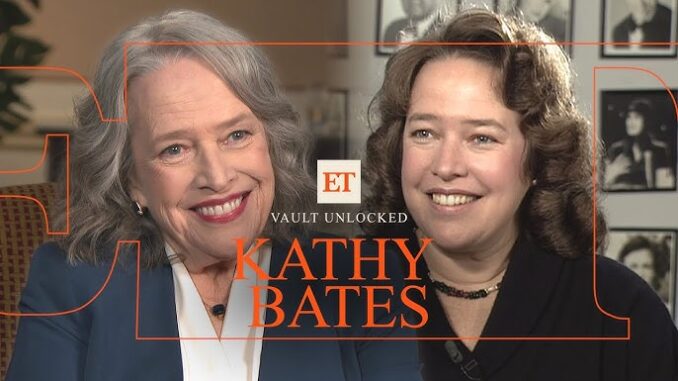
The Unseen Battle Behind the Unflinching Gaze: Kathy Bates' Illustrative Struggle
The name Kathy Bates conjures images of unyielding strength, of characters who command the screen with a formidable presence and a gaze that brooks no argument. From the terrifyingly possessive Annie Wilkes in Misery to the indomitable Molly Brown in Titanic, Bates has consistently embodied women of power, wit, and unforgettable resolve. Yet, beneath this public facade of unwavering confidence, a recent revelation shines a poignant light on a private, lifelong battle: a pervasive struggle with body image, a fractured sense of self-worth, and the enduring ache of feeling like an outsider. Her story is not merely a celebrity confession; it is an illustrative essay on the insidious ways societal pressures and internal narratives can erode the spirit, even of the most celebrated among us.
The feeling of being an "outsider" often takes root early, a subtle but persistent deviation from perceived norms. For Bates, a woman of immense talent and undeniable charisma, this feeling was likely amplified by the unforgiving lens of Hollywood. While she carved an extraordinary niche for herself, rejecting the conventional ingenue roles, the very act of existing outside the industry's narrow beauty standards could paradoxically reinforce a deep-seated sense of difference. She wasn't the "leading lady" in the traditional sense, but the "character actress," a label that, while honoring her versatility, might have simultaneously whispered to her inner self that she didn't quite belong in the gilded circle of conventional glamour. This experience resonates with countless individuals who, despite their unique gifts, are made to feel less-than because they don't conform to a prescribed ideal, whether in appearance, personality, or background.
Body image, an extension of this outsider narrative, became a silent, relentless tormentor. In an industry obsessed with youth and a specific, often unattainable, physique, Bates navigated her career while battling her own reflection. Imagine the internal dissonance: to inhabit characters like Annie Wilkes, a woman who wields terrifying control and physical dominance, or to portray the spirited Molly Brown, who famously declared, "I'm unsinkable!"—all while a quiet, insidious voice whispered inadequacies about the vessel housing that power. Her professional triumphs, the Oscar nominations, the accolades, could not silence the phantom tape measure, the critical gaze in the mirror, or the societal messages that relentlessly tell women they are "too much" or "not enough." This struggle illustrates how deeply ingrained self-perception can be, a tenacious root system that withstands even the most flourishing external success.
The cumulative weight of feeling like an outsider and battling a negative body image inevitably erodes self-worth. For Bates, it wasn't a question of talent; her genius was undeniable. It was a question of intrinsic value, the fundamental belief in one's own deservingness of happiness and acceptance. The chasm between the confident, commanding presence she projected on screen and the private whispers of "not good enough" must have been profound. This is the heart of her illustrative struggle: demonstrating that external validation, be it critical acclaim or audience adoration, is often insufficient to mend the deepest wounds of self-doubt. True self-worth is an internal construct, painstakingly built, brick by fragile brick, often requiring years of conscious effort to dismantle the internal critic.
Kathy Bates' courage in revealing these lifelong struggles is itself an act of profound self-worth. By speaking her truth, she cracks open a window into a universal human experience, validating the silent battles fought by millions. Her story is an urgent reminder that behind every confident smile, every public triumph, and every unflinching gaze, there can be a private landscape of vulnerability and doubt. It illustrates that the journey towards self-acceptance is not a linear path, nor is it exclusive to those outside the limelight. Instead, it is a continuous process of challenging internal narratives, resisting societal pressures, and ultimately, learning to embrace the messy, imperfect, yet undeniably resilient self. Her revelation is not just about Kathy Bates; it is a mirror held up to us all, urging us to look beyond appearances and cultivate a deeper, more compassionate understanding of ourselves and each other.
